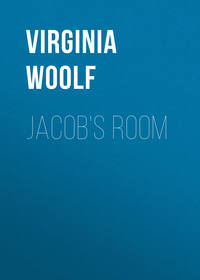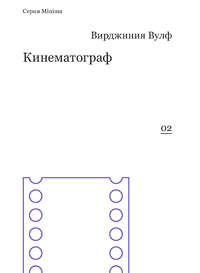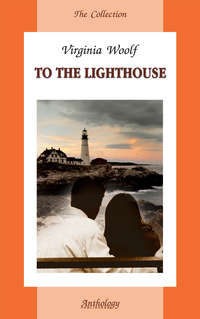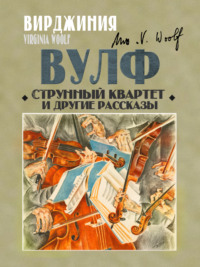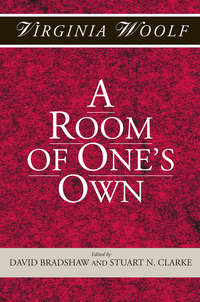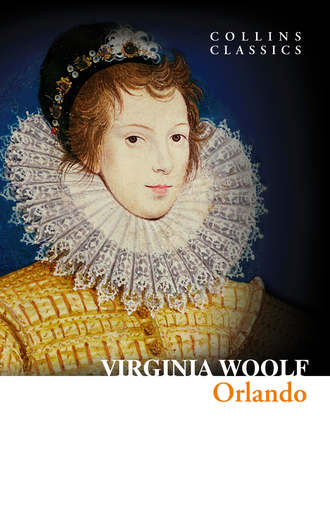
Полная версия
Orlando
So he waited in the darkness. Suddenly he was struck in the face by a blow, soft, yet heavy, on the side of his cheek. So strung with expectation was he, that he started and put his hand to his sword. The blow was repeated a dozen times on forehead and cheek. The dry frost had lasted so long that it took him a minute to realize that these were raindrops falling; the blows were the blows of the rain. At first, they fell slowly, deliberately, one by one. But soon the six drops became sixty; then six hundred; then ran themselves together in a steady spout of water. It was as if the hard and consolidated sky poured itself forth in one profuse fountain. In the space of five minutes Orlando was soaked to the skin.
Hastily putting the horses under cover, he sought shelter beneath the lintel of the door whence he could still observe the courtyard. The air was thicker now than ever, and such a steaming and droning rose from the downpour that no footfall of man or beast could be heard above it. The roads, pitted as they were with great holes, would be under water and perhaps impassable. But of what effect this would have upon their flight he scarcely thought. All his senses were bent upon gazing along the cobbled pathway–gleaming in the light of the lantern–for Sasha’s coming. Sometimes, in the darkness, he seemed to see her wrapped about with rain strokes. But the phantom vanished. Suddenly, with an awful and ominous voice, a voice full of horror and alarm which raised every hair of anguish in Orlando’s soul, St. Paul’s struck the first stroke of midnight. Four times more it struck remorselessly. With the superstition of a lover, Orlando had made out that it was on the sixth stroke that she would come. But the sixth stroke echoed away, and the seventh came and the eighth, and to his apprehensive mind they seemed notes first heralding and then proclaiming death and disaster. When the twelfth struck he knew that his doom was sealed. It was useless for the rational part of him to reason; she might be late; she might be prevented; she might have missed her way. The passionate and feeling heart of Orlando knew the truth. Other clocks struck, jangling one after another. The whole world seemed to ring with the news of her deceit and his derision. The old suspicions subterraneously at work in him rushed forth from concealment openly. He was bitten by a swarm of snakes, each more poisonous than the last. He stood in the doorway in the tremendous rain without moving. As the minutes passed, he sagged a little at the knees. The downpour rushed on. In the thick of it, great guns seemed to boom. Huge noises as of the tearing and rending of oak trees could be heard. There were also wild cries and terrible inhuman groanings. But Orlando stood there immovable till Paul’s clock struck two, and then, crying aloud with an awful irony, and all his teeth showing, “Jour de ma vie!” he dashed the lantern to the ground, mounted his horse and galloped he knew not where.
Some blind instinct, for he was past reasoning, must have driven him to take the river bank in the direction of the sea. For when the dawn broke, which it did with unusual suddenness, the sky turning a pale yellow and the rain almost ceasing, he found himself on the banks of the Thames off Wapping. Now a sight of the most extraordinary nature met his eyes. Where, for three months and more, there had been solid ice of such thickness that it seemed permanent as stone, and a whole gay city had been stood on its pavement, was now a race of turbulent yellow waters. The river had gained its freedom in the night. It was as if a sulphur spring (to which view many philosophers inclined) had risen from the volcanic regions beneath and burst the ice asunder with such vehemence that it swept the huge and massy fragments furiously apart. The mere look of the water was enough to turn one giddy. All was riot and confusion. The river was strewn with icebergs. Some of these were as broad as a bowling green and as high as a house; others no bigger than a man’s hat, but most fantastically twisted. Now would come down a whole convoy of ice blocks sinking everything that stood in their way. Now, eddying and swirling like a tortured serpent, the river would seem to be hurtling itself between the fragments and tossing them from bank to bank, so that they could be heard smashing against the piers and pillars. But what was the most awful and inspiring of terror was the sight of the human creatures who had been trapped in the night and now paced their twisting and precarious islands in the utmost agony of spirit. Whether they jumped into the flood or stayed on the ice their doom was certain. Sometimes quite a cluster of these poor creatures would come down together, some on their knees, others suckling their babies. One old man seemed to be reading aloud from a holy book. At other times, and his fate perhaps was the most dreadful, a solitary wretch would stride his narrow tenement alone. As they swept out to sea, some could be heard crying vainly for help, making wild promises to amend their ways, confessing their sins and vowing altars and wealth if God would hear their prayers. Others were so dazed with terror that they sat immovable and silent looking steadfastly before them. One crew of young watermen or post-boys, to judge by their liveries, roared and shouted the lewdest tavern songs, as if in bravado, and were dashed against a tree and sunk with blasphemies on their lips. An old nobleman–for such his furred gown and golden chain proclaimed him–went down not far from where Orlando stood, calling vengeance upon the Irish rebels, who, he cried with his last breath, had plotted this devilry. Many perished clasping some silver pot or other treasure to their breasts; and at least a score of poor wretches were drowned by their own cupidity, hurling themselves from the bank into the flood rather than let a gold goblet escape them, or see before their eyes the disappearance of some furred gown. For furniture, valuables, possessions of all sorts were carried away on the icebergs. Among other strange sights was to be seen a cat suckling its young; a table laid sumptuously for a supper of twenty; a couple in bed; together with an extraordinary number of cooking utensils.
Dazed and astounded, Orlando could do nothing for some time but watch the appalling race of waters as it hurled itself past him. At last, seeming to recollect himself, he clapped spurs to his horse and galloped hard along the river bank in the direction of the sea. Rounding a bend of the river, he came opposite that reach where, not two days ago, the ships of the Ambassadors had seemed immovably frozen. Hastily, he made count of them all; the French; the Spanish; the Austrian; the Turk. All still floated, though the French had broken loose from her moorings, and the Turkish vessel had taken a great rent in her side and was fast filling with water. But the Russian ship was nowhere to be seen. For one moment Orlando thought it must have foundered; but, raising himself in his stirrups and shading his eyes, which had the sight of a hawk’s, he could just make out the shape of a ship on the horizon. The black eagles were flying from the mast head. The ship of the Muscovite Embassy was standing out to sea.
Flinging himself from his horse, he made, in his rage, as if he would breast the flood. Standing knee-deep in water he hurled at the faithless woman all the insults that have ever been the lot of her sex. Faithless, mutable, fickle, he called her; devil, adulteress, deceiver; and the swirling waters took his words, and tossed at his feet a broken pot and a little straw.
CHAPTER 2
The biographer is now faced with a difficulty which it is better perhaps to confess than to gloss over. Up to this point in telling the story of Orlando’s life, documents, both private and historical, have made it possible to fulfil the first duty of a biographer, which is to plod, without looking to right or left, in the indelible footprints of truth; unenticed by flowers; regardless of shade; on and on methodically till we fall plump into the grave and write finis on the tombstone above our heads. But now we come to an episode which lies right across our path, so that there is no ignoring it. Yet it is dark, mysterious, and undocumented; so that there is no explaining it. Volumes might be written in interpretation of it; whole religious systems founded upon the signification of it. Our simple duty is to state the facts as far as they are known, and so let the reader make of them what he may.
In the summer of that disastrous winter which saw the frost, the flood, the deaths of many thousands, and the complete downfall of Orlando’s hopes–for he was exiled from Court; in deep disgrace with the most powerful nobles of his time; the Irish house of Desmond was justly enraged; the King had already trouble enough with the Irish not to relish this further addition–in that summer Orlando retired to his great house in the country and there lived in complete solitude. One June morning–it was Saturday the 18th–he failed to rise at his usual hour, and when his groom went to call him he was found fast asleep. Nor could he be awakened. He lay as if in a trance, without perceptible breathing; and though dogs were set to bark under his window; cymbals, drums, bones beaten perpetually in his room; a gorse bush put under his pillow; and mustard plasters applied to his feet, still he did not wake, take food, or show any sign of life for seven whole days. On the seventh day he woke at his usual time (a quarter before eight, precisely) and turned the whole posse of caterwauling wives and village soothsayers out of his room, which was natural enough; but what was strange was that he showed no consciousness of any such trance, but dressed himself and sent for his horse as if he had woken from a single night’s slumber. Yet some change, it was suspected, must have taken place in the chambers of his brain, for though he was perfectly rational and seemed graver and more sedate in his ways than before, he appeared to have an imperfect recollection of his past life. He would listen when people spoke of the great frost or the skating or the carnival, but he never gave any sign, except by passing his hand across his brow as if to wipe away some cloud, of having witnessed them himself. When the events of the past six months were discussed, he seemed not so much distressed as puzzled, as if he were troubled by confused memories of sometime long gone or were trying to recall stories told him by another. It was observed that if Russia was mentioned or Princesses or ships, he would fall into a gloom of an uneasy kind and get up and look out of the window or call one of the dogs to him, or take a knife and carve a piece of cedar wood. But the doctors were hardly wiser then than they are now, and after prescribing rest and exercise, starvation and nourishment, society and solitude, that he should lie in bed all day and ride forty miles between lunch and dinner, together with the usual sedatives and irritants, diversified, as the fancy took them, with possets of newt’s slobber on rising, and draughts of peacock’s gall on going to bed, they left him to himself, and gave it as their opinion that he had been asleep for a week.
But if sleep it was, of what nature, we can scarcely refrain from asking, are such sleeps as these? Are they remedial measures–trances in which the most galling memories, events that seem likely to cripple life forever, are brushed with a dark wing which rubs their harshness off and gilds them, even the ugliest and basest, with a lustre, an incandescence? Has the finger of death to be laid on the tumult of life from time to time lest it rend us asunder? Are we so made that we have to take death in small doses daily or we could not go on with the business of living? And then what strange powers are these that penetrate our most secret ways and change our most treasured possessions without our willing it? Had Orlando, worn out by the extremity of his suffering, died for a week, and then come to life again? And if so, of what nature is death and of what nature life? Having waited well over half an hour for an answer to these questions, and none coming, let us get on with the story.
Now Orlando gave himself up to a life of extreme solitude. His disgrace at Court and the violence of his grief were partly the reason of it, but as he made no effort to defend himself and seldom invited anyone to visit him (though he had many friends who would willingly have done so) it appeared as if to be alone in the great house of his fathers suited his temper. Solitude was his choice. How he spent his time, nobody quite knew. The servants, of whom he kept a full retinue, though much of their business was to dust empty rooms and to smooth the coverlets of beds that were never slept in, watched, in the dark of the evening, as they sat over their cakes and ale, a light passing along the galleries, through the banqueting halls, up the staircase, into the bedrooms, and knew that their master was perambulating the house alone. None dared follow him, for the house was haunted by a great variety of ghosts, and the extent of it made it easy to lose one’s way and either fall down some hidden staircase or open a door which, should the wind blow it to, would shut upon one for ever–accidents of no uncommon occurrence, as the frequent discovery of the skeletons of men and animals in attitudes of great agony made evident. Then the light would be lost altogether, and Mrs. Grimsditch, the housekeeper, would say to Mr. Dupper, the chaplain, how she hoped his Lordship had not met with some bad accident. Mr. Dupper would opine that his Lordship was on his knees, no doubt, among the tombs of his ancestors in the Chapel, which was in the Billiard Table Court, half a mile away on the south side. For he had sins on his conscience, Mr. Dupper was afraid; upon which Mrs. Grimsditch would retort, rather sharply, that so had most of us; and Mrs. Stewkley and Mrs. Field and old Nurse Carpenter would all raise their voices in his Lordship’s praise; and the grooms and the stewards would swear that it was a thousand pities to see so fine a nobleman moping about the house when he might be hunting the fox or chasing the deer; and even the little laundry maids and scullery maids, the Judys and the Faiths, who were handing round the tankards and cakes, would pipe up their testimony to his Lordship’s gallantry; for never was there a kinder gentleman, or one more free with those little pieces of silver which serve to buy a knot of ribbon or put a posy in one’s hair; until even the Blackamoor whom they called Grace Robinson by way of making a Christian woman of her, understood what they were at, and agreed that his Lordship was a handsome, pleasant, darling gentleman in the only way she could, that is to say by showing all her teeth at once in a broad grin. In short, all his serving men and women held him in high respect, and cursed the foreign Princess (but they called her by a coarser name than that) who had brought him to this pass.
But though it was probably cowardice, or love of hot ale, that led Mr. Dupper to imagine his Lordship safe among the tombs so that he need not go in search of him, it may well have been that Mr. Dupper was right. Orlando now took a strange delight in thoughts of death and decay, and, after pacing the long galleries and ballrooms with a taper in his hand, looking at picture after picture as if he sought the likeness of somebody whom he could not find, would mount into the family pew and sit for hours watching the banners stir and the moonlight waver with a bat or death’s head moth to keep him company. Even this was not enough for him, but he must descend into the crypt where his ancestors lay, coffin piled upon coffin, for ten generations together. The place was so seldom visited that the rats made free with the lead work, and now a thigh bone would catch at his cloak as he passed, or he would crack the skull of some old Sir Malise as it rolled beneath his foot. It was a ghastly sepulchre; dug deep beneath the foundations of the house as if the first Lord of the family, who had come from France with the Conqueror, had wished to testify how all pomp is built upon corruption; how the skeleton lies beneath the flesh: how we that dance and sing above must lie below; how the crimson velvet turns to dust; how the ring (here Orlando, stooping his lantern, would pick up a gold circle lacking a stone, that had rolled into a corner) loses its ruby and the eye which was so lustrous shines no more. “Nothing remains of all these Princes,” Orlando would say, indulging in some pardonable exaggeration of their rank, “except one digit,” and he would take a skeleton hand in his and bend the joints this way and that. “Whose hand was it?” he went on to ask. “The right or the left? The hand of man or woman, of age or youth? Had it urged the war horse, or plied the needle? Had it plucked the rose, or grasped cold steel? Had it–” but here either his invention failed him or, what is more likely, provided him with so many instances of what a hand can do that he shrank, as his wont was, from the cardinal labour of composition, which is excision, and he put it with the other bones, thinking how there was a writer called Thomas Browne, a Doctor of Norwich, whose writing upon such subjects took his fancy amazingly.
So, taking his lantern and seeing that the bones were in order, for though romantic, he was singularly methodical and detested nothing so much as a ball of string on the floor, let alone the skull of an ancestor, he returned to that curious, moody pacing down the galleries, looking for something among the pictures, which was interrupted at length by a veritable spasm of sobbing, at the sight of a Dutch snow scene by an unknown artist. Then it seemed to him that life was not worth living any more. Forgetting the bones of his ancestors and how life is founded on a grave, he stood there shaken with sobs, all for the desire of a woman in Russian trousers, with slanting eyes, a pouting mouth and pearls about her neck. She had gone. She had left him. He was never to see her again. And so he sobbed. And so he found his way back to his own rooms; and Mrs. Grimsditch, seeing the light in the window, put the tankard from her lips and said Praise be to God, his Lordship was safe in his room again; for she had been thinking all this while that he was foully murdered.
Orlando now drew his chair up to the table; opened the works of Sir Thomas Browne and proceeded to investigate the delicate articulation of one of the doctor’s longest and most marvellously contorted cogitations.
For though these are not matters on which a biographer can profitably enlarge it is plain enough to those who have done a reader’s part in making up from bare hints dropped here and there the whole boundary and circumference of a living person; can hear in what we only whisper a living voice; can see, often when we say nothing about it, exactly what he looked like; know without a word to guide them precisely what he thought–and it is for readers such as these that we write–it is plain then to such a reader that Orlando was strangely compounded of many humours–of melancholy, of indolence, of passion, of love of solitude, to say nothing of all those contortions and subtleties of temper which were indicated on the first page, when he slashed at a dead nigger’s head; cut it down; hung it chivalrously out of his reach again and then betook himself to the window seat with a book. The taste for books was an early one. As a child he was sometimes found at midnight by a page still reading. They took his taper away, and he bred glow-worms to serve his purpose. They took the glow-worms away, and he almost burnt the house down with a tinder. To put it in a nutshell, leaving the novelist to smooth out the crumpled silk and all its implications, he was a nobleman afflicted with a love of literature. Many people of his time, still more of his rank, escaped the infection and were thus free to run or ride or make love at their own sweet will. But some were early infected by a germ said to be bred of the pollen of the asphodel and to be blown out of Greece and Italy, which was of so deadly a nature that it would shake the hand as it was raised to strike, and cloud the eye as it sought its prey, and make the tongue stammer as it declared its love. It was the fatal nature of this disease to substitute a phantom for reality, so that Orlando, to whom fortune had given every gift–plate, linen, houses, men-servants, carpets, beds in profusion–had only to open a book for the whole vast accumulation to turn to mist. The nine acres of stone which were his house vanished; one hundred and fifty indoor servants disappeared; his eighty riding horses became invisible; it would take too long to count the carpets, sofas, trappings, china, plate, cruets, chafing dishes and other movables often of beaten gold, which evaporated like so much sea mist under the miasma. So it was, and Orlando would sit by himself, reading, a naked man.
The disease gained rapidly upon him now in his solitude. He would read often six hours into the night; and when they came to him for orders about the slaughtering of cattle or the harvesting of wheat, he would push away his folio and look as if he did not understand what was said to him. This was bad enough and wrung the hearts of Hall, the falconer, of Giles, the groom, of Mrs. Grimsditch, the housekeeper, of Mr. Dupper, the chaplain. A fine gentleman like that, they said, had no need of books. Let him leave books, they said, to the palsied or the dying. But worse was to come. For once the disease of reading has laid upon the system it weakens it so that it falls an easy prey to that other scourge which dwells in the inkpot and festers in the quill. The wretch takes to writing. And while this is bad enough in a poor man, whose only property is a chair and a table set beneath a leaky roof–for he has not much to lose, after all–the plight of a rich man, who has houses and cattle, maidservants, asses and linen, and yet writes books, is pitiable in the extreme. The flavour of it all goes out of him; he is riddled by hot irons; gnawed by vermin. He would give every penny he has (such is the malignity of the germ) to write one little book and become famous; yet all the gold in Peru will not buy him the treasure of a well-turned line. So he falls into consumption and sickness, blows his brains out, turns his face to the wall. It matters not in what attitude they find him. He has passed through the gates of Death and known the flames of Hell.
Happily, Orlando was of a strong constitution and the disease (for reasons presently to be given) never broke him down as it has broken many of his peers. But he was deeply smitten with it, as the sequel shows. For when he had read for an hour or so in Sir Thomas Browne, and the bark of the stag and the call of the night watchman showed that it was the dead of night and all safe asleep, he crossed the room, took a silver key from his pocket and unlocked the doors of a great inlaid cabinet which stood in the corner. Within were some fifty drawers of cedar wood and upon each was a paper neatly written in Orlando’s hand. He paused, as if hesitating which to open. One was inscribed “The Death of Ajax,” another “The Birth of Pyramus,” another “Iphigenia in Aulis,” another “The Death of Hippolytus,” another “Meleager,” another “The Return of Odysseus”–in fact there was scarcely a single drawer that lacked the name of some mythological personage at a crisis of his career. In each drawer lay a document of considerable size all written over in Orlando’s hand. The truth was that Orlando had been afflicted thus for many years. Never had any boy begged apples as Orlando begged paper; nor sweetmeats as he begged ink. Stealing away from talk and games, he had hidden himself behind curtains, in priest’s holes, or in the cupboard behind his mother’s bedroom which had a great hole in the floor and smelt horribly of starling’s dung, with an inkhorn in one hand, a pen in another, and on his knee a roll of paper. Thus had been written, before he was turned twenty-five, some forty-seven plays, histories, romances, poems; some in prose, some in verse; some in French, some in Italian; all romantic, and all long. One he had had printed by John Ball of the Feathers and Coronet opposite St. Paul’s Cross, Cheapside; but though the sight of it gave him extreme delight, he had never dared show it even to his mother, since to write, much more to publish, was, he knew, for a nobleman an inexpiable disgrace.


